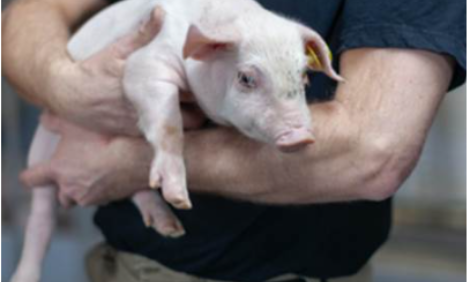



Lysozyme as Alternative to Antibiotics Improves Nursery Pig Performance During Indirect Immune Challenge
Lysozyme is a 1,4-Beta-N-acetylmuramidase that has antimicrobial properties. The objective of this study was to determine the effect of lysozyme and antibiotics on growth performance and immune response during an indirect immune challenge, write W. T. Oliver, J. E. Wells, and C. V. Maxwell, from the USDA, US Meat Animal Research Center and the University of Arkansas.Introduction
Antibiotics have been fed at subtherapeutic levels to swine as growth promoters for more than 60 yr, and the majority of swine produced in the United States received antibiotics in their feed at some point in their production cycle.
These compounds benefit the producers by minimizing production losses by increasing feed efficiency and decreasing susceptibility to bacterial infection and disease (Verstegen and Williams, 2002).
Lysozyme is a 1,4-β-N-acetylmuramidase that enzymatically cleaves a glycosidic linkage in the peptidoglycan component of bacterial cell walls, which results in the loss of cellular membrane integrity and cell death (Ellison and Giehl, 1991). We have identified lysozyme as a suitable alternative to antibiotics (May et al., 2012; Oliver and Wells, 2013).
It is well established that immune system activation, including proinflammatory cytokine and acute phase protein production, prevents animals from reaching their genetic growth potential (Cook, 2011).
Poultry and swine reared in germ-free environments grow at a faster rate than animals reared in conventional production environments (Drew et al., 2003; Loynachan et al., 2005). In addition, utilizing a clean vs. dirty environment model elicits an immune response that decreases animal performance (Roura et al., 1992; Bassaganya-Riera et al., 2001; Renaudeau et al., 2011).
In pigs, an immune response does not generally result in decreased feed conversion (Williams et al., 1997a,b; Renaudeau, 2009). However, both lysozyme (Oliver and Wells, 2013) and antibiotics (Verstegen and Williams, 2002) improve feed efficiency in nursery swine.
In addition, Nyachoti et al. (2012) reported that lysozyme alleviated the piglet response to an oral challenge of Escherichia coli K88 similarly to traditional antibiotics. Thus, our objective was to determine the efficacy of lysozyme in ameliorating the effect of an immune response in pigs weaned from the sow at 26 d of age.








